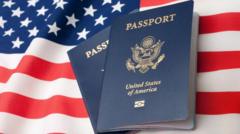As President Trump seeks to eliminate birthright citizenship, this article explores the historical and contemporary stances on citizenship laws worldwide, revealing a growing trend towards stricter regulations and the implications for immigrant families.
Global Perspectives on Birthright Citizenship Amidst Trump's Controversial Move

Global Perspectives on Birthright Citizenship Amidst Trump's Controversial Move
A closer look at how the U.S. approach to birthright citizenship compares with practices in other nations following Trump's push to end automatic citizenship for those born on American soil.
In the wake of President Donald Trump's executive order aimed at terminating birthright citizenship, a contentious debate has surged within the United States, alongside legal battles initiated by numerous states and civil rights groups. The 14th Amendment, which has assured citizenship for anyone born in the U.S. for nearly 160 years, is now under scrutiny as Trump advocates for restrictions on citizenship rights for children of undocumented immigrants and individuals on temporary visas. A recent Emerson College poll indicates that Trump's move has garnered significant public support, raising questions about the wider implications for immigrant families in America.
Globally, however, the principle of birthright citizenship, or jus soli, is far from universal. The U.S. stands as one of around 30 countries that automatically confer citizenship based on birthplace, a practice largely confined to the Americas. In contrast, many Asian, European, and African nations have adopted jus sanguinis—granting citizenship based on parental nationality rather than place of birth. John Skrentny, a sociology professor at UCSD, emphasizes the historical and unique paths that countries have taken regarding citizenship, significantly influenced by their colonial legacies and socio-political contexts.
Recent years have witnessed a shift in several countries towards stricter citizenship regulations, amidst rising concerns about immigration and national identity. For instance, India modified its laws, now requiring both parents to hold citizenship for children born in the country. Likewise, African nations that once followed the jus soli principle have reformed their laws to include parentage requirements for citizenship.
Europe has also tightened its citizenship laws, with Ireland being a recent example, having abolished unrestricted jus soli in response to the practice of “birth tourism.” A controversial constitutional amendment in the Dominican Republic has led to the denial of citizenship to children of undocumented migrants, a move condemned by international rights organizations. Although a 2014 law was implemented to mitigate the effects, it still reflects a broader global tendency towards restrictive citizenship policies.
As Trump's executive order faces legal challenges from various fronts, constitutional experts argue that it cannot merely be enacted via an executive order. With the case set to navigate through the court system, its potential implications remain uncertain, particularly if it reaches the Supreme Court, where interpretations of the 14th Amendment may diverge widely. As nations grapple with the balance between citizenship rights and immigration control, the global landscape of nationality law continues to evolve dramatically.






















